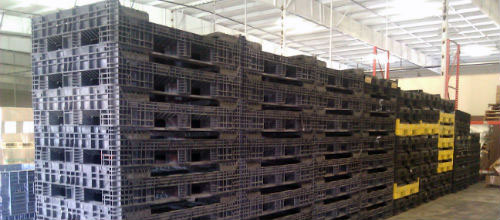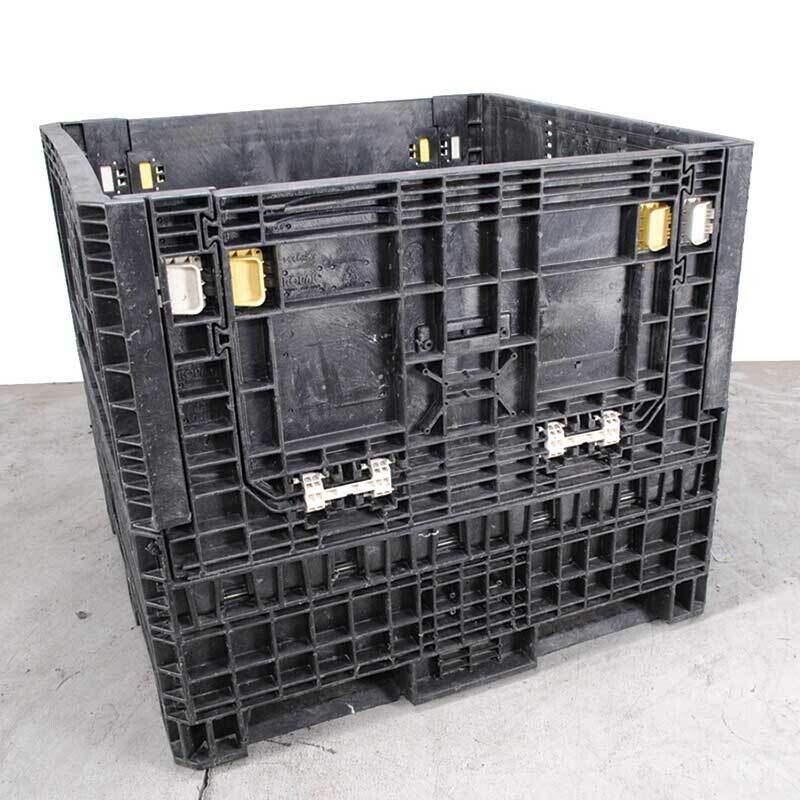The importance of used plastic containers in efficient material handling
Why Mass Containers Are Important for Cost-Effective and lasting Transport
Mass containers play an important function in contemporary logistics. They promote the efficient motion of huge amounts of goods, thus maximizing transport procedures. This approach not only reduces prices but additionally minimizes ecological impact with reduced exhausts and waste generation. As industries seek more sustainable methods, the adoption of bulk containers is ending up being increasingly considerable. What implications does this shift hold for future logistics and supply chain administration?

The Advantages of Making Use Of Mass Containers in Logistics
Mass containers revolutionize logistics by improving effectiveness and sustainability. These containers enable the transport of big amounts of products in a solitary journey, substantially decreasing the number of trips called for. This not just simplifies procedures yet likewise reduces labor prices associated with handling, loading, and discharging. Additionally, bulk containers are made to optimize room usage within transportation automobiles, guaranteeing that more products can be shipped at the same time.
The standardization of mass containers likewise streamlines the logistics procedure. With uniform measurements, they can be quickly piled and stored, bring about improved warehouse administration. Mass containers commonly feature durable materials that shield components from damages throughout transit, thereby decreasing item loss and raising overall integrity. Because of this, companies can experience improved supply chain efficiency, eventually causing boosted profitability and customer satisfaction. This mix of aspects makes bulk containers a vital possession in contemporary logistics.
Environmental Impact: Minimizing Waste and Carbon Footprint
As sectors significantly prioritize sustainability, the fostering of bulk containers has actually emerged as a key method for decreasing waste and reducing carbon impacts. These containers reduce using packaging products, such as boxes and plastic, therefore significantly reducing general waste generation. By settling deliveries, mass containers enhance transport efficiency, allowing for more products to be delivered per trip. This decrease in journeys directly associates with reduced greenhouse gas exhausts, adding to a smaller sized carbon footprint.
Moreover, mass containers can usually be recycled or reused, further mitigating environmental impact. The resilience of these containers assurances they can withstand several transportation cycles, reducing the requirement for single-use choices. used collapsible containers. By streamlining logistics and promoting effective source use, mass containers not only sustain lasting techniques yet also urge industries to straighten with worldwide environmental objectives. Inevitably, their implementation shows a commitment to ecological stewardship and liable source management
Price Savings: Exactly How Bulk Containers Lower Transport Expenditures
While numerous companies seek methods to improve their profits, making use of bulk containers provides a substantial opportunity for reducing transport expenses. Mass containers optimize the quantity of goods transferred, permitting organizations to ship larger amounts at when. This effectiveness reduces the number of journeys called for, directly reducing gas costs and reducing labor expenditures related to loading and dumping.
In addition, mass containers commonly include structured layouts that enhance room use within transport vehicles. This means fewer empty areas, resulting in a lot more effective use of offered ability. The toughness of mass containers can decrease the danger of item damages during transit, decreasing losses and making certain that more goods show up intact.
Enhancing Supply Chain Effectiveness With Mass Storage Solutions
Mass storage space remedies play an essential duty in enhancing supply chain effectiveness by optimizing stock monitoring. By consolidating goods into fewer, bigger containers, services can greatly decrease managing prices related to frequent transfers and handling. This streamlined technique allows for much better tracking and administration of stock, ultimately leading to enhanced operational efficiency.
Structured Supply Monitoring
Reliable supply monitoring is essential for maximizing supply chain operations, specifically when organizations adopt bulk storage space remedies. These remedies allow businesses to keep higher supply degrees while reducing the frequency of replenishment. By combining materials into mass containers, firms can enhance their inventory procedures, lowering the intricacy connected with tracking several smaller bundles. This strategy facilitates exact inventory counts and enhances forecasting precision, permitting more enlightened decision-making. Additionally, mass storage space options streamline stockroom company, making it much easier to locate and gain access to products when required. Consequently, companies can accomplish a more efficient stock turnover rate, inevitably enhancing overall supply chain performance and decreasing the chance of stockouts or overstock scenarios.

Minimized Handling Expenses
The application of bulk storage space solutions not just enhances inventory monitoring however likewise substantially decreases handling costs throughout the supply chain. By settling materials into bulk containers, firms reduce the demand for frequent handling and transfer between various storage space and transportation systems. This method reduces labor costs connected with loading, discharging, and relocating smaller sized bundles. In addition, bulk storage space decreases the regularity of deliveries, leading to lower transport costs and decreased fuel consumption. Therefore, services can enhance their logistics procedures, permitting a much more effective allocation of resources. Inevitably, lowered dealing with costs add to enhanced total supply chain performance, cultivating an environment that sustains both sustainability and economic stability.

Adaptability of Bulk Containers Across Different Industries
Although several markets have unique demands for transportation and storage space, bulk containers have actually arised as a flexible option that meets a large range of requirements. These containers, ranging from huge containers to specialized storage tanks, can suit diverse products, consisting of powders, granules, and liquids. In basics the farming field, mass containers assist in the transport of grains and plant foods, while the food and beverage industry uses them for components and ended up items. The chemical market relies upon mass containers for securely delivering harmful products, ensuring compliance with safety regulations. In addition, building and construction firms take advantage of mass containers for transporting accumulations and various other materials. Their flexibility includes different settings of transport, including vehicles, trains, and ships, improving logistical effectiveness. This flexibility not just simplifies operations across various markets however additionally promotes sustainability by minimizing packaging waste and enhancing area in transit. Therefore, mass containers play an important duty in contemporary supply chain monitoring.
Future Trends wholesale Container Use and Sustainability
The future of bulk container usage is increasingly shaped by innovative products advancement that improves sustainability. Additionally, automation in logistics guarantees to improve procedures, minimizing waste and improving efficiency. Welcoming round economic situation techniques will further revolutionize just how bulk containers are made, utilized, and recycled, promoting a much more sustainable transportation landscape.
Innovative Materials Advancement
As industries significantly prioritize sustainability, ingenious products growth in mass containers arises as a considerable factor in improving environment-friendly transport options. Researchers and producers are discovering eco-friendly plastics, recycled compounds, and light-weight metals to reduce environmental impact. These materials not only lessen waste but likewise boost gas effectiveness by decreasing the general weight of containers. In addition, innovations in smart materials, which can adapt to varying problems, improve the toughness and performance of bulk containers. The combination of these cutting-edge materials aligns with round economic situation concepts, advertising reuse and recycling. As the need for sustainable practices grows, the advancement of such products will certainly play an important duty fit the future of bulk container use in logistics and transportation.
Automation in Logistics
Substantial innovations in automation are poised to transform logistics and the use of bulk containers, boosting sustainability in transport. Automated systems, consisting of drones and autonomous vehicles, are simplifying the activity of mass containers, minimizing the dependence on standard fuel-powered transport. These innovations optimize transmitting and loading processes, decreasing vacant miles and boosting fuel performance. Furthermore, automated supply administration systems boost monitoring and tracking of mass containers, ensuring better resource allowance and lowered waste. The combination of the Internet of Things (IoT) permits real-time information evaluation, allowing aggressive decision-making that aligns with sustainability goals. As automation remains to advance, it is expected to drive better developments in bulk container use, eventually sustaining even more sustainable logistics methods and lowering the ecological influence of transport.
Round Economic Situation Practices
Improvements in automation are establishing the stage for a more incorporated technique to round economic climate practices in the domain of mass container usage. As markets increasingly welcome sustainability, bulk containers are being designed for durability visit our website and reusability. This change not just minimizes waste however additionally improves source performance. Companies are taking on strategies such as closed-loop systems, where utilized containers are collected, refurbished, and reintroduced into the supply chain. Additionally, smart modern technologies track container life cycles, helping with much better management and lowering ecological influence. The cooperation in between producers, logistics suppliers, and end-users is essential in developing requirements for lasting container usage. refurbished bulk containers. Future trends suggest an expanding focus on products that are biodegradable and recyclable, additional strengthening the circular economic climate's principles in bulk transport

Frequently Asked Concerns
What Products Are Mass Containers Generally Made From?
Bulk containers are normally built from long lasting materials such as high-density polyethylene, steel, cardboard, and aluminum. These products give stamina, versatility, and protection, making them suitable for transferring different goods in different markets efficiently.
Just how Do I Choose the Right Dimension Mass Container?
Choosing the best dimension bulk container entails examining the volume of products to be transferred, considering dealing with tools compatibility, and evaluating storage room needs. Appropriate dimension assurances performance in transport and minimizes waste during delivery.
Are Mass Containers Reusable or Recyclable?
Bulk containers are often multiple-use, made for several trips, boosting sustainability. Many can likewise be recycled, depending upon the products utilized. Picking recyclable choices additionally sustains environmental objectives and reduces waste in transport practices.
What Security Rules Apply to Mass Container Transport?
Security policies this link for bulk container transport consist of conformity with the Department of Transport guidelines, proper labeling of unsafe products, structural stability analyses, and adherence to weight restrictions to guarantee risk-free handling and stop mishaps during transportation.
How Can Companies Change to Making Use Of Bulk Containers Effectively?
Organizations can change to bulk containers by evaluating present logistics, educating personnel on handling, purchasing ideal devices, enhancing inventory management, and working together with suppliers to assure compatibility and efficiency throughout the supply chain.
As markets increasingly focus on sustainability, the adoption of mass containers has emerged as a vital strategy for lowering waste and decreasing carbon impacts. By consolidating materials right into mass containers, companies can streamline their inventory procedures, reducing the complexity associated with tracking multiple smaller sized plans. As markets increasingly focus on sustainability, ingenious materials development in bulk containers arises as a significant variable in enhancing green transport remedies. Automated systems, consisting of drones and self-governing vehicles, are enhancing the movement of mass containers, minimizing the dependence on traditional fuel-powered transport. In addition, automated supply administration systems boost monitoring and tracking of bulk containers, ensuring better source allotment and reduced waste.